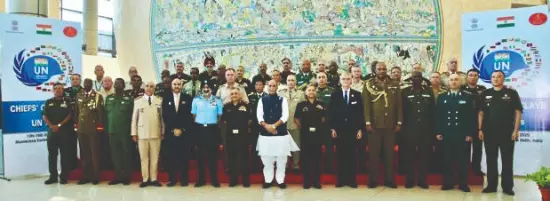India calls for technological overhaul in global peacekeeping at UNTCC 2025

New Delhi: On the first day of the three-day United Nations Troop Contributing Countries’ Chiefs Conclave (UNTCC) 2025, being organised for the first time in India, a stern appeal was made to modernise international peacekeeping during a meeting at the Manekshaw Centre in the national capital. Starting the tone, Chief of Army Staff General Upendra Dwivedi on Monday, demanded a paradigm shift from traditional, troop-based deployments and towards highly flexible, technologically empowered, and preventive efforts.
Operations in the future will have to be founded on imagination, flexibility, and immediate intelligence, he asserted, in an age marked by hybrid warfare and non-state actors. General Dwivedi highlighted that contemporary conflicts demand “brains behind the network” as well as “boots on the ground,” and UN mandates that provide enhanced operational flexibility in dealing with dynamic changing ground realities. The conclave helped to further accentuate the leadership role of India, underscored by its contribution of close to 290,000 personnel to more than 50 UN missions and its New Delhi-based Centre for UN Peacekeeping, which has trained officers from 90 countries. In tune with this vision, Defence minister Rajnath Singh also announced a strategic “4C” model—Consultation, Cooperation, Coordination, and Capacity Building—to steer the future global initiative. He appealed to technologically more advanced countries to share important assets such as secure communications, surveillance networks, and Unmanned Aerial Vehicles to reinforce the security and efficiency of peacekeepers on the new battlefield. Both leaders unanimously stressed the urgent need for UN reforms, describing existing multilateral mechanisms as outdated and ill-prepared for contemporary security challenges.
With a strong operational bias, Lieutenant General Rajiv Ghai made explicit connections between India’s recent counter-terrorism operation, Operation Sindoor, and the future of peacekeeping. He outlined the carefully crafted, tri-service operation, initiated after a ghastly terrorist attack in Pahalgam, as a model of “measured compellence” that combined military effectiveness with diplomatic and economic pressure. Ghai introduced the operation, which in 88 hours succeeded in its goals, as a doctrine of distinction that lies outside traditional war and peace and presents crucial lessons in graduated response and strategic restraint. The conclave ended on a firm note: the international peacekeeping of the future needs to be proactive, technology-driven, and values-based. With its extensive experience and proven commitment, India has put itself at the vanguard of spearheading this necessary global change.



